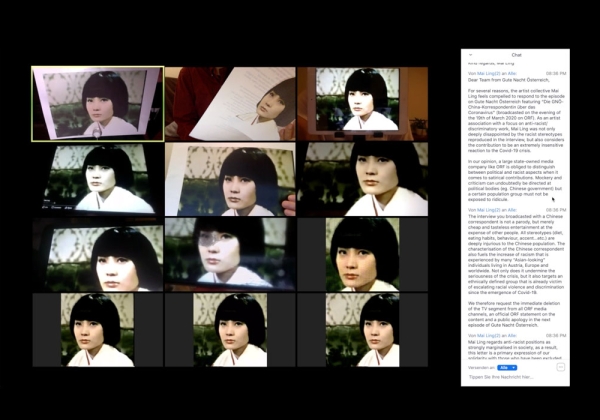The artist collective and association Mai Ling is a platform to share experiences, struggles,
and practices of anti-racism, sexism, and homophobia especially against Asian FLINT*. “Mai Ling,” a fictional figure scripted
by a German comedian in 1979, embodies a submissive hybrid stereotype of an Asian woman. Mai Ling re-narrates and reclaims
“Mai Ling” with collective voices and multi-layered identities.
Founded in Vienna in 2019, the
artist collective and association Mai Ling is a platform to share experiences, struggles and practices of anti-racism, sexism,
homophobia, and any kind of prejudice toward one's difference, especially against Asian FLINT*. The name “Mai Ling” refers
to a fictional figure created by German comedian Gerhard Polt in 1979. “Mai Ling” is a submissive Asian hybrid – her flight
starts in Bangkok, she is wearing a kimono and cooking Chinese food. She does not speak for herself; instead, all the information
about her is given by her husband who demonstrates the clichés of a white, chauvinistic, and ignorant man. Triggered by this
fictional character whose stereotype still lingers today, Mai Ling, as an anonymous artist collective, re-narrates, reclaims,
and portrays “Mai Ling” with multilayered voices and identities, that both challenge and reflect on collectivity and the conflicts
within it. Mai Ling aims to shed light on how prejudice, discrimination, and silencing are historically, culturally, and politically
interwoven.
The start of Mai Ling began with an eagerness to encourage discourse amongst Asian migrants in Vienna
who work in the arts. There was the necessity to foster communities by exchanging and bringing issues of intersectional discrimination
into the public discourse. Since then, Mai Ling has been exploring the sense of comfort, care, pleasure, and community through
art projects, community gatherings, protests, and activist activities that narrate through Asian diasporic and migrant perspectives.
Collaboration as an artist collective allows Mai Ling to keep un/learning and inspiring each other. It is a survival
tool for Mai Ling. At the same time, working collectively is challenging, and Mai Ling constantly seeks alternative modes
for collective practices.
http://mai-ling.orgwww.ortsbezogenekunst.at



